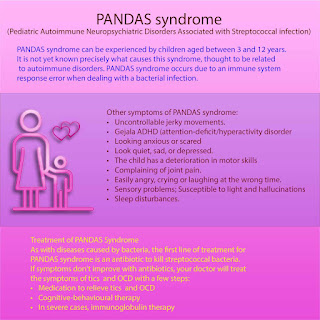PANDAS Syndrome
PANDAS syndrome
makes a child turn into a different figure, usually occurring 4-6 weeks
after streptococcal infection. The child can be suddenly moody, anxious,
aggressive, obsessive-compulsive behavior, or uncontrolled body movements.
What's the cause?
PANDAS syndrome
can be experienced by children aged between 3 and 12 years. It is not yet known
precisely what causes this syndrome, thought to be related to autoimmune
disorders. PANDAS syndrome occurs due to an error in the immune system response
when facing a bacterial infection. As a result, antibodies attack specific
areas of the brain and cause neuropsychiatric disorders. Streptococcal
bacteria masquerade so that they look like normal cells. When the immune system
finally finds and fights it, it sometimes also fights the cells replicated by Streptococcus.
Recognize the symptoms
Children with
PANDAS syndrome suddenly show obsessive-compulsive disorders(OCD), tics, or both. Changes in their
personality and behavior occur quickly and dramatically after developing a
strep throat infection.
Ocd symptoms
cause an unsanctionable thought or an urge to perform specific actions
repeatedly.
Tics are movements or sounds made suddenly and
repeatedly and cannot be controlled by the child. They may blink a lot or jerk
their heads. The child suddenly grunts, clears his throat constantly or
repeats the exact words in other behaviors.
For children who
have previously experienced OCD or tics, this condition will worsen the situation.
Other symptoms of PANDAS syndrome:
- Uncontrollable jerky movements.
- Symptoms of ADHD(attention-deficit
/ hyperactivity disorder), among others; hyperactivity, restless
children, and difficulty focusing
- Look anxious or frightened when away
from their parents or caregivers.
- Look quiet, sad, or depressed.
- Children experience deterioration in
motor skills, for example, in writing or in other fine motor movements.
- Complaining of joint pain.
- Easily angry, crying, or laughing at
the wrong time.
- Sensory problems; They are susceptible
to light, and the child feels that he sees something that does not
exist(hallucinations).
- Sleep disturbances.
Treatment of PANDAS Syndrome
As with diseases
caused by bacteria, the first line of treatment for PANDAS syndrome is an
antibiotic to kill streptococcal bacteria. If symptoms don't improve with
antibiotics, your doctor will treat the symptoms of tics and OCD with a few steps:
- Taking medications to relieve tics
and OCD, which start at low doses, while monitoring the symptoms.
- Cognitive-behavioral therapy to help
children control obsessive behavior and anxiety disorders.
- In severe cases, doctors recommend
immunoglobulin therapy and blood plasma exchange.
Support factors
from the family are indeed beneficial for the treatment of PANDAS syndrome.







